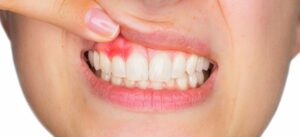Science Behind a Confident Smile Series- Part 1 of 4

Think of your mouth like a car. (Stay with me here, it will make sense in a minute.) If you take good care of your vehicle, you don’t just visit the mechanic when you hear funny noises or the engine starts to smoke. You rotate your tires, change your oil regularly and do a multi-point inspection just to make sure everything is in good working order.
Like your car, it is just as important to check for signs of a healthy mouth as it is to check for signs of disease. Understanding what goes on in a healthy mouth helps you keep everything in good working order and stay vigilant for signs of a problem.
On that note, we put together our own multi-point inspection for a healthy mouth. Here is what to look for in a well-tuned mouth, preventative steps you can take to keep it that way, and of course, the science behind it all.
Your Gums: A Consistent Color
Like skin tone, healthy gums range in color. Yours might be red, pink, or dark brown. The important thing to look for is consistency, both throughout your entire mouth and over time. If your gums change color in a short period of time, or if portions of your gums are darker or lighter than usual, this is a cause for concern.
A change to your gum color might be the result of something innocuous like an amalgam tattoo — harmless and caused when particles from fillings and crowns become dislodged — or it might be the sign of something more serious, like gingivitis or trench mouth, an acute form of gingivitis that causes a layer of dead tissue to build up over the gums.
As the first stop on your multi-point inspection, scan your gums to check for dark or light spots or changes in color. If you notice anything unusual, it’s time to give your dentist a call.
Your Gums: Firm to the Touch and Flush to Your Teeth
Color isn’t the only thing to look for when it comes to healthy gums. Your gums, aka gingiva, play an important role in keeping teeth in line, anchoring them in your mouth, and protecting them from shocks. Made up of fleshy tissue, they are covered by a layer of mucous membrane and adhere to your teeth with tiny fibers called the periodontal membrane.
In a healthy mouth, your gums appear snug against your teeth, not loose. This snug fit minimizes the chance of gum disease by keeping bacteria away from your roots. Healthy gums are also firm to the touch, not puffy, and they rarely bleed when you brush or floss. Puffiness and bleeding are early signs of gum disease.
If you notice puffiness, bleeding, or pocketing on your gums, a week or so of vigilance is often enough to remedy. Floss daily and brush twice a day in a gentle circular motion. If these symptoms continue, make an appointment with your dentist.
For more information or to schedule you and your family for a dental exam and cleaning, please call us at (425) 318-7689. Dr. Jessica Chen at Duvall Family Dental is acaring and compassionate dentist looking forward to answering your questions.
The above post is from: https://www.deltadentalwa.com/blog/entry/2019/06/science-behind-confident-smiles





 Website Powered by Sesame 24-7™
Website Powered by Sesame 24-7™